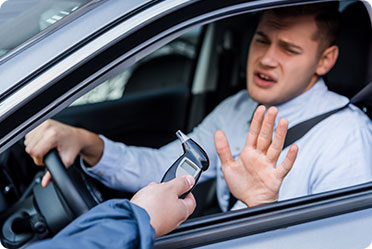
When you hear about a breath test or a breathalyzer, you may think of it as a single device, but the truth is there are many different types, and not all breath tests are equal. That can be good news for you if you are facing a DUI charge. Some tests are not very reliable, and because of this, sometimes judges will completely toss out the results of a case. Some manufacturers also do not release information on how their machines work, so it can be difficult to prove that the results are accurate in court. An experienced DUI lawyer will know the ins and outs of the system and understand how each breath test works, in order to defend your rights in court.
Preliminary Breathalyzer Test
The Preliminary Breathalyzer Test, or PBT, is the test that they give you before the arrest is made. Typically, you breathe into a device, and it gives a result to the officer. There are many physiological factors that render this type of testing unreliable. This test can sometimes be used to show that probable cause existed for the DUI arrest, but cannot be considered evidence of guilt in New Jersey and Pennsylvania courts.
Intoxylizer
This breath alcohol testing device uses infrared spectroscopy to detect alcohol. It inidentifies alcohol molecules based on the way they absorb infrared light. Typically, these breath tests are done at the police station, although some departments have mobile units. Like the preliminary breathalyzer tests, these devices must be properly calibrated and maintained for accuracy in order to give reliable results. Certain physiological factors, such as mouth alcohol caused by acid reflux, dentures, mouthwash, or vomiting, can artificially inflate the breath results.
ALCOTEST 7110 MKIIIC
This breath test detects alcohol through the use of a fuel cell and infrared spectroscopy. With the fuel cell, the breath that is exhaled into the device is oxidized by the two platinum electrodes. When ethyl alcohol is present, oxidation occurs. More oxidation occurs with the increased presence of alcohol. As oxidation occurs, an electrical current is produced. A microprocessor measures this current to calculate the blood alcohol content. Operators must be properly trained in the use and calibration of the device in order for the results to be accurate.
The science behind all of these devices can get very complicated. Often, DUI lawyers will call in expert witnesses to testify on the use (or misuse) of the device. Investigating what devices were used, how they were used, and exactly how they were maintained, calibrated, and tested previous to the breath test can help to fight your case. An experienced DUI attorney will be familiar with the different devices and understand how to get the information you need from the police department and prosecutor.
Even if you have “failed” a breath test, there is hope, especially if you believe the results were wrong. With an experienced DUI attorney on your side, you can work to build a defense for your case. The consequences for a DUI conviction are serious – jail time, fines, license suspension so you should give your case the attention it deserves.
Leckerman Law focuses on safeguarding the
rights of individuals charged with DUI, DWI, DAI, and
other alcohol-related criminal offenses - Call Us Now For
NJ DWI (856) 429-2323 | For PA DUI (215) 496-9292